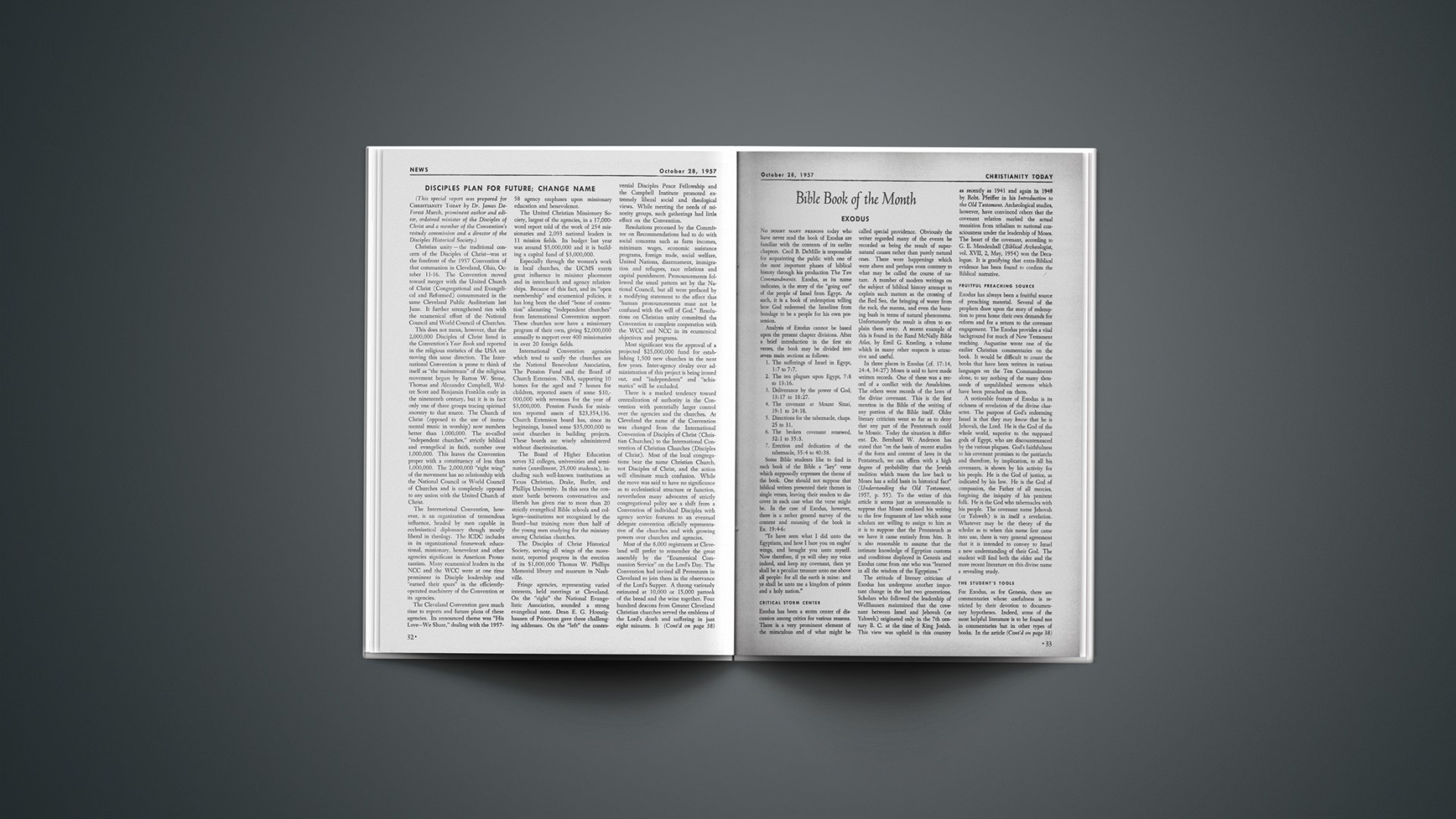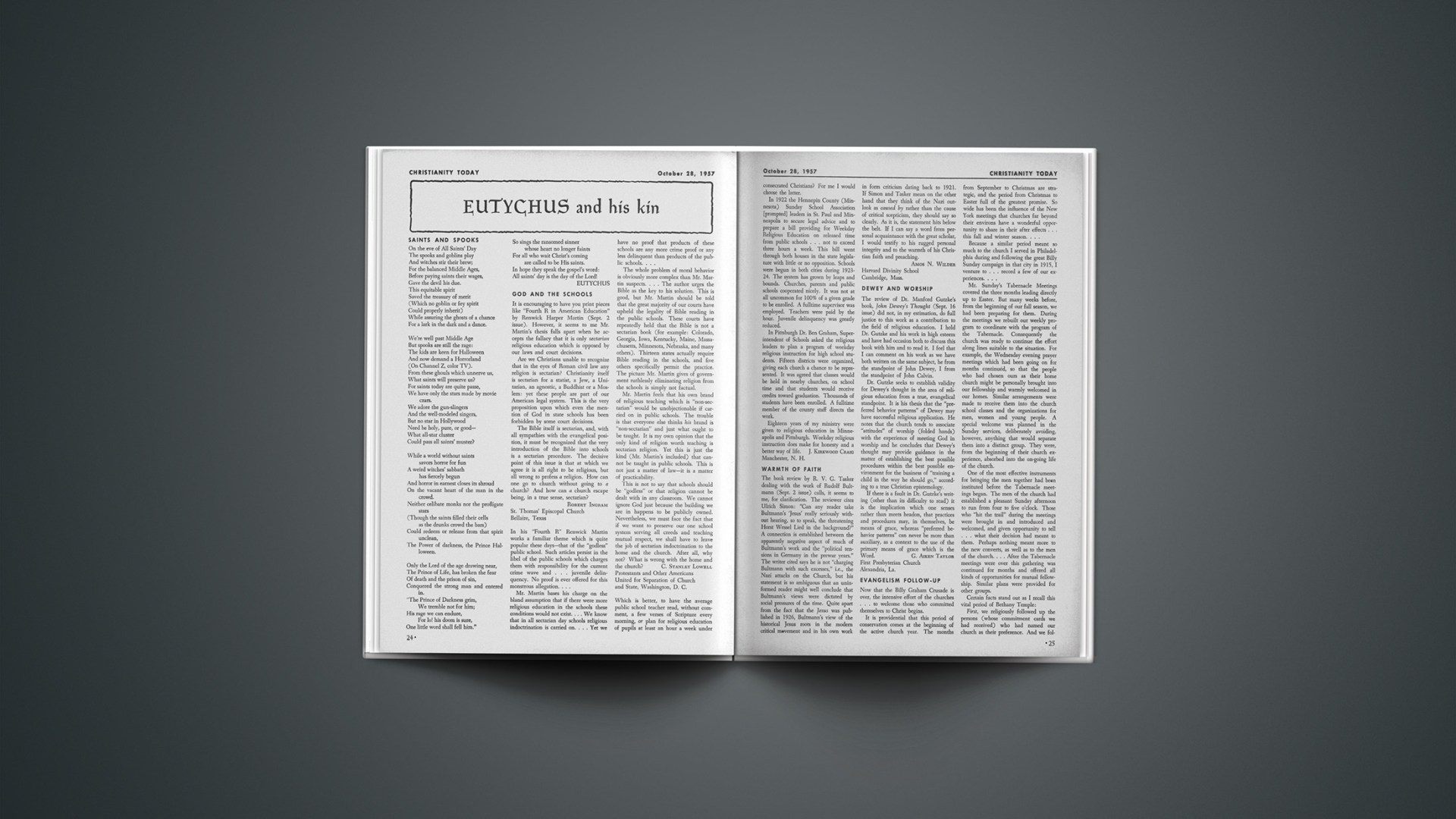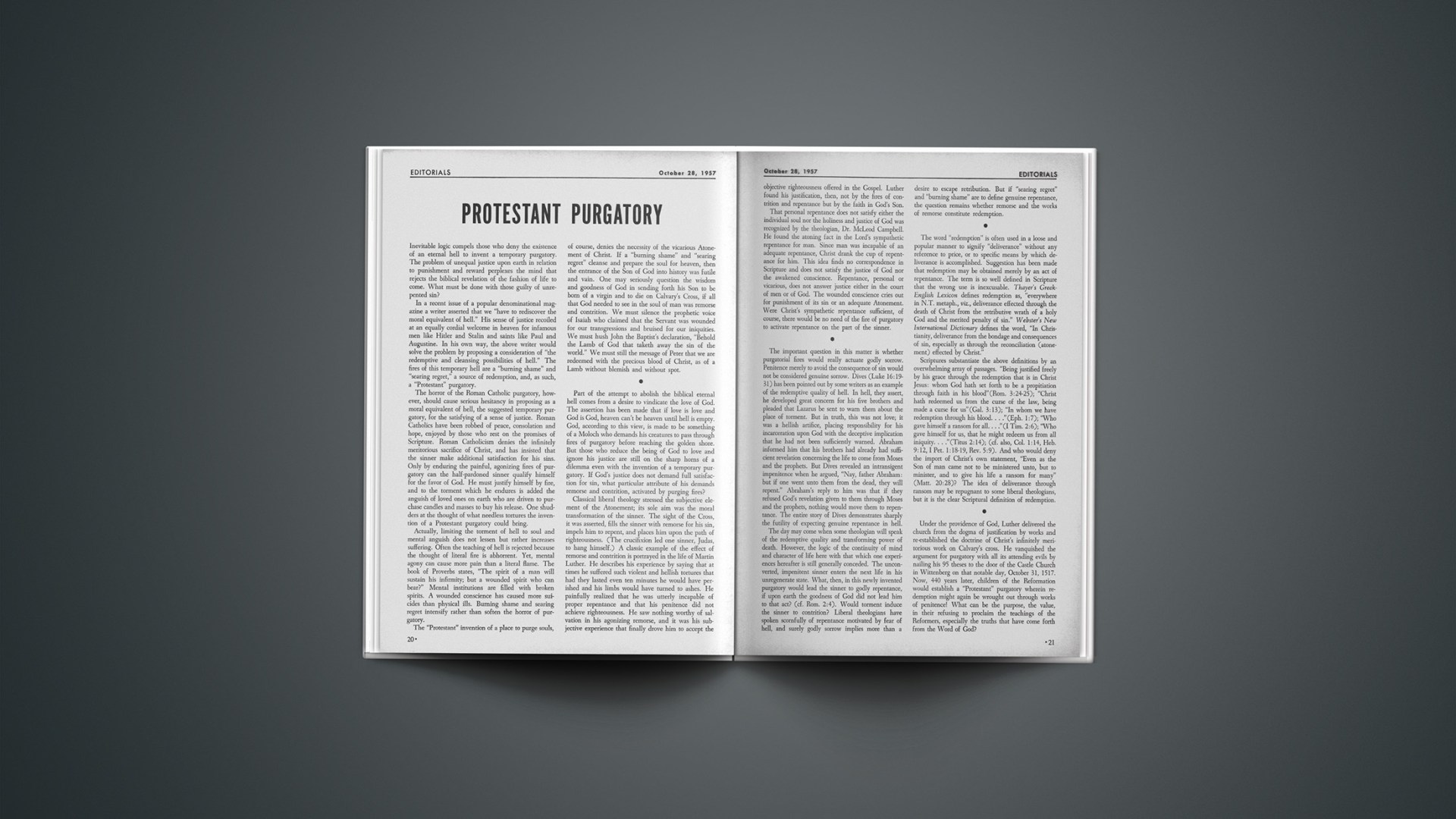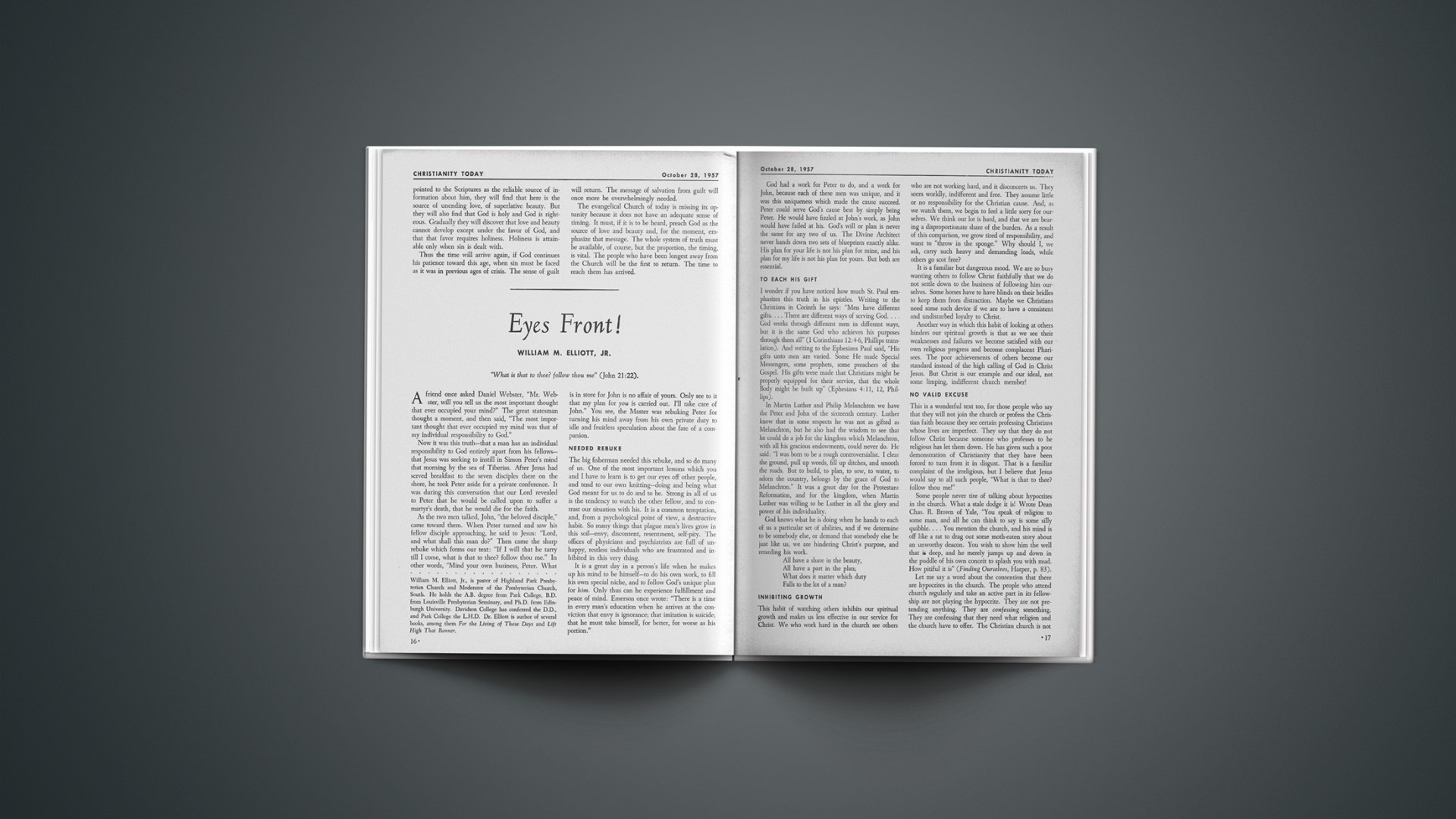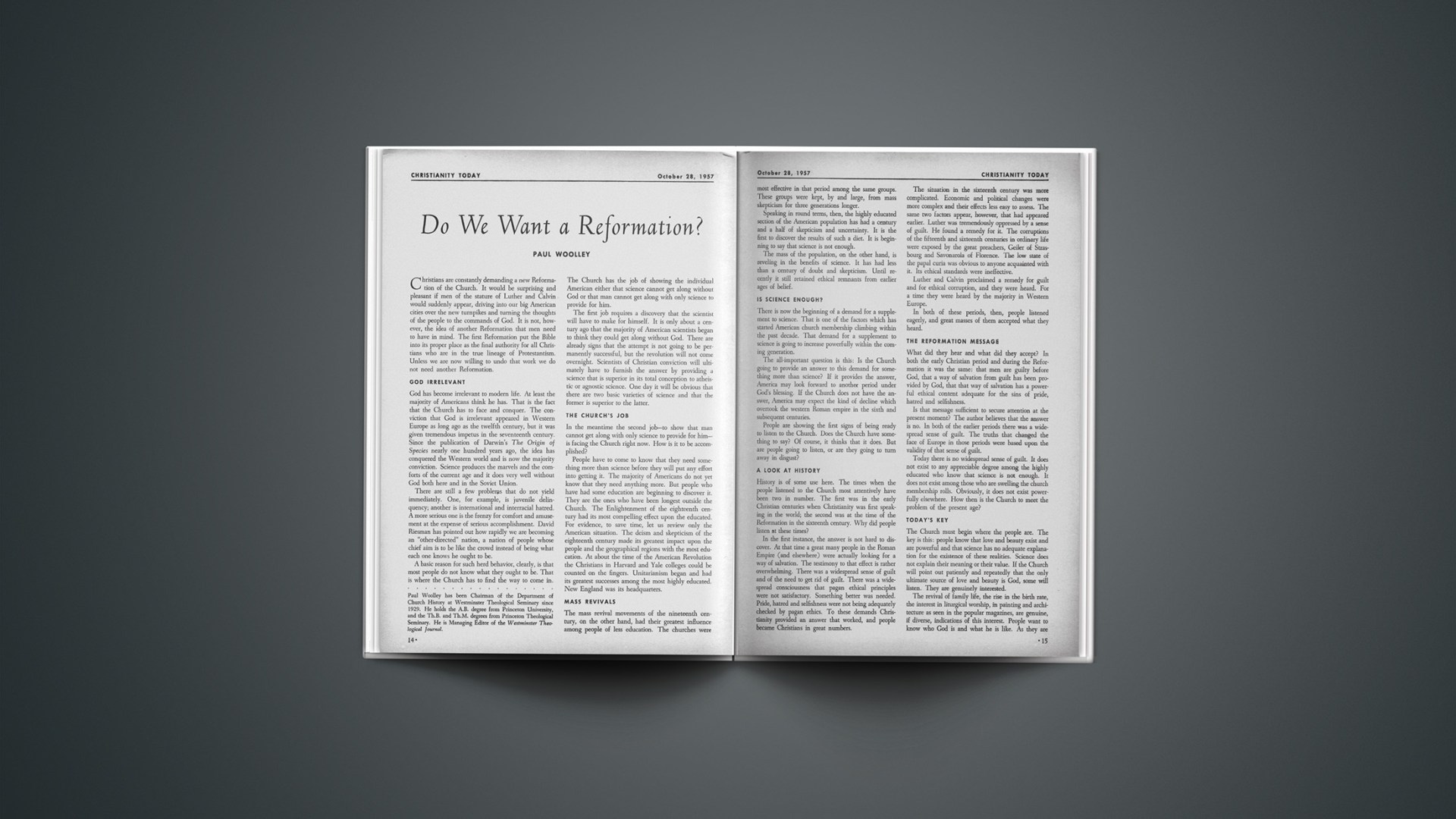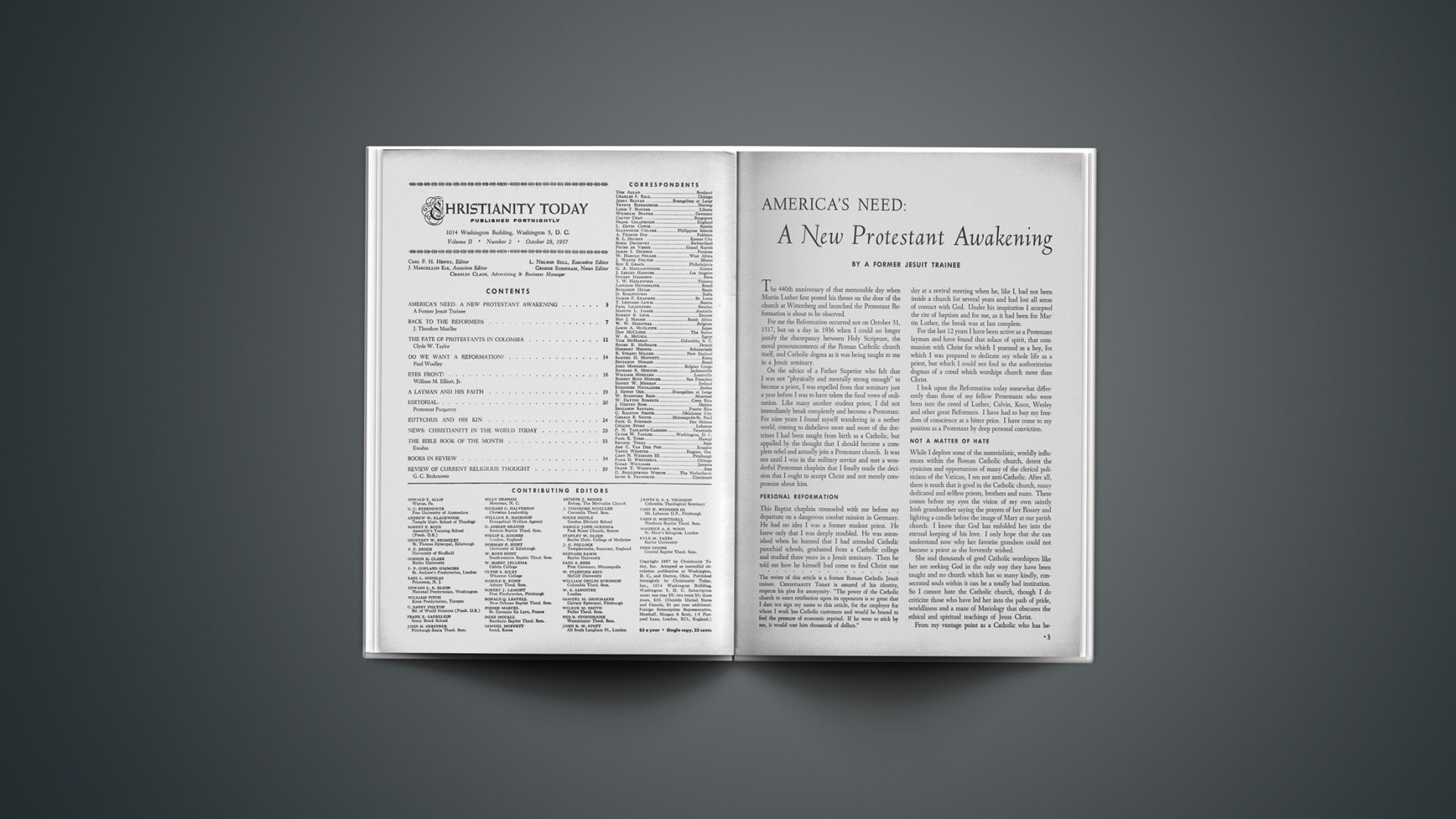No doubt many persons today who have never read the book of Exodus are familiar with the contents of its earlier chapters. Cecil B. DeMille is responsible for acquainting the public with one of the most important phases of biblical history through his production The Ten Commandments. Exodus, as its name indicates, is the story of the “going out” of the people of Israel from Egypt. As such, it is a book of redemption telling how God redeemed the Israelites from bondage to be a people for his own possession.
Analysis of Exodus cannot be based upon the present chapter divisions. After a brief introduction in the first six verses, the book may be divided into seven main sections as follows:
1. The sufferings of Israel in Egypt, 1:7 to 7:7.
2. The ten plagues upon Egypt, 7:8 to 13:16.
3. Deliverance by the power of God, 13:17 to 18:27.
4. The covenant at Mount Sinai, 19:1 to 24:18.
5. Directions for the tabernacle, chaps. 25 to 31.
6. The broken covenant renewed, 32:1 to 35:3.
7. Erection and dedication of the tabernacle, 35:4 to 40:38.
Some Bible students like to find in each book of the Bible a “key” verse which supposedly expresses the theme of the book. One should not suppose that biblical writers presented their themes in single verses, leaving their readers to discover in each case what the verse might be. In the case of Exodus, however, there is a rather general survey of the content and meaning of the book in Ex. 19:4–6:
“Ye have seen what I did unto the Egyptians, and how I bare you on eagles’ wings, and brought you unto myself. Now therefore, if ye will obey my voice indeed, and keep my covenant, then ye shall be a peculiar treasure unto me above all people: for all the earth is mine: and ye shall be unto me a kingdom of priests and a holy nation.”
Critical Storm Center
Exodus has been a storm center of discussion among critics for various reasons. There is a very prominent element of the miraculous and of what might be called special providence. Obviously the writer regarded many of the events he recorded as being the result of supernatural causes rather than purely natural ones. There were happenings which were above and perhaps even contrary to what may be called the course of nature. A number of modern writings on the subject of biblical history attempt to explain such matters as the crossing of the Red Sea, the bringing of water from the rock, the manna, and even the burning bush in terms of natural phenomena. Unfortunately the result is often to explain them away. A recent example of this is found in the Rand McNally Bible Atlas, by Emil G. Kraeling, a volume which in many other respects is attractive and useful.
In three places in Exodus (cf. 17:14, 24:4, 34:27) Moses is said to have made written records. One of these was a record of a conflict with the Amalekites. The others were records of the laws of the divine covenant. This is the first mention in the Bible of the writing of any portion of the Bible itself. Older literary criticism went so far as to deny that any part of the Pentateuch could be Mosaic. Today the situation is different. Dr. Bernhard W. Anderson has stated that “on the basis of recent studies of the form and content of laws in the Pentateuch, we can affirm with a high degree of probability that the Jewish tradition which traces the law back to Moses has a solid basis in historical fact” (Understanding the Old Testament, 1957, p. 55). To the writer of this article it seems just as unreasonable to suppose that Moses confined his writing to the few fragments of law which some scholars are willing to assign to him as it is to suppose that the Pentateuch as we have it came entirely from him. It is also reasonable to assume that the intimate knowledge of Egyptian customs and conditions displayed in Genesis and Exodus came from one who was “learned in all the wisdom of the Egyptians.”
The attitude of literary criticism of Exodus has undergone another important change in the last two generations. Scholars who followed the leadership of Wellhausen maintained that the covenant between Israel and Jehovah (or Yahweh) originated only in the 7th century B. C. at the time of King Josiah. This view was upheld in this country as recently as 1941 and again in 1948 by Robt. Pfeiffer in his Introduction to the Old Testament. Archeological studies, however, have convinced others that the covenant relation marked the actual transition from tribalism to national consciousness under the leadership of Moses. The heart of the covenant, according to G. E. Mendenhall (Biblical Archeologist, vol. XVII, 2, May, 1954) was the Decalogue. It is gratifying that extra-Biblical evidence has been found to confirm the Biblical narrative.
Fruitful Preaching Source
Exodus has always been a fruitful source of preaching material. Several of the prophets draw upon the story of redemption to press home their own demands for reform and for a return to the covenant engagement. The Exodus provides a vital background for much of New Testament teaching. Augustine wrote one of the earlier Christian commentaries on the book. It would be difficult to count the books that have been written in various languages on the Ten Commandments alone, to say nothing of the many thousands of unpublished sermons which have been preached on them.
A noticeable feature of Exodus is its richness of revelation of the divine character. The purpose of God’s redeeming Israel is that they may know that he is Jehovah, the Lord. He is the God of the whole world, superior to the supposed gods of Egypt, who are discountenanced by the various plagues. God’s faithfulness to his covenant promises to the patriarchs and therefore, by implication, to all his covenants, is shown by his activity for his people. He is the God of justice, as indicated by his law. He is the God of compassion, the Father of all mercies, forgiving the iniquity of his penitent folk. He is the God who tabernacles with his people. The covenant name Jehovah (or Yahweh) is in itself a revelation. Whatever may be the theory of the scholar as to when this name first came into use, there is very general agreement that it is intended to convey to Israel a new understanding of their God. The student will find both the older and the more recent literature on this divine name a revealing study.
The Student’S Tools
For Exodus, as for Genesis, there are commentaries whose usefulness is retricted by their devotion to documentary hypotheses. Indeed, some of the most helpful literature is to be found not in commentaries but in other types of books. In the article on Genesis in Christianity Today (Mar. 4, 1957) several of these in the fields of archeology and Bible history were suggested. In the International Standard Bible Encyclopedia will be found discussions of some of the pertinent problems of the Exodus, such as the date and the numbers of the Israelites. Some of this material, however, is outdated by more recent findings in archeology. An older work which is enlightening in its content and devotional in style is Alfred Edersheim’s The Exodus and the Wanderings in the Wilderness.
Among the commentaries there will not be found as many separate works on Exodus as for some other Old Testament writings. Two of the older and more conservative works which commend themselves to the writer’s opinion are the work on Exodus in the Keil and Delitzsch series and that by F. C. Cook in The Speaker’s Bible Commentary. The outstanding modern work is, of course, the Interpreter’s Bible, in which the exegesis is done by J. C. Rylaarsdam and the exposition by J. E. Park. The work contains many conclusions with which the writer of this article cannot agree and it tends to fragmentize Exodus in what seems an unnecessary fashion. Nevertheless, there are many excellent insights into the meaning of the text and a wholesome recognition of the essential theological ideas which the reader should grasp.
For a good presentation of the various names of God found in the Old Testament, most of which are present in Exodus, the reader is advised to consult the recent volume by Herman Bavinck, The Doctrine of God, and the pertinent sections of Geerhardus Vos’ Biblical Theology.
The tabernacle and its services are regarded by the New Testament as foreshadowing the person and work of our Lord Jesus Christ. This has given rise to the study of typology through most of the period of the Christian church. Vos’ work mentioned above avoids most of the unwholesome extremes to which some writers have gone. A much more extensive study of the symbolism of the tabernacle is that of Patrick Fairbairn in his Typology of the Scriptures.
Exodus stands in close relation to the rest of the Bible. It is the story of the fulfilment of covenant promises made in Genesis. It is the record of deliverance which is celebrated in the Psalms, the historical books and the prophets. The temples of Solomon, of Ezra and of Herod all took their general design from that of the tabernacle described in Exodus. When John states “the Word was made flesh and tabernacled among us,” he reflects the language of Exodus, where God dwelt in the midst of his people. The assertion of Paul, “Christ our passover is sacrificed for us,” takes its meaning from the Passover feast as described in Exodus 12. The apostle Peter in 1 Peter 2:9 uses the precise words of Exodus 19:6 to describe the Christian church as the Israel of God. A great deal of the Epistle to the Hebrews is taken up with showing that the “ordinances of divine service” and the “earthly sanctuary” of the Old Testament were intended to foreshadow the saving work of Jesus Christ. He who is well acquainted with the Book of Exodus will have a deeper insight into the grace of God which brings salvation.
DAVID W. KERR

